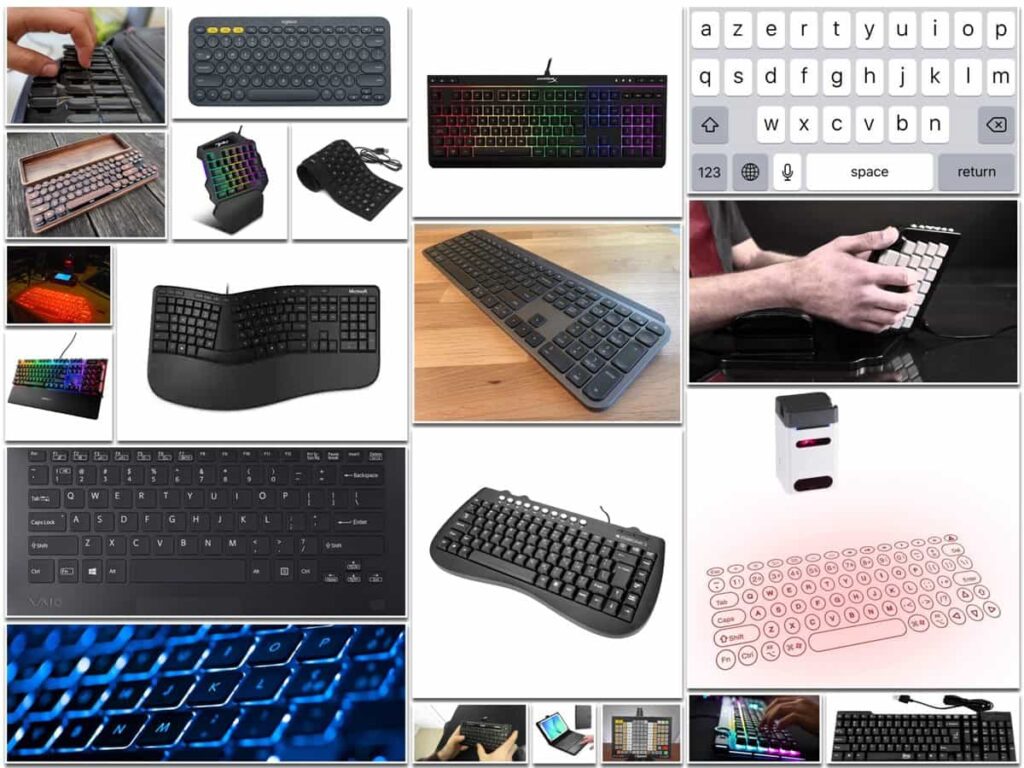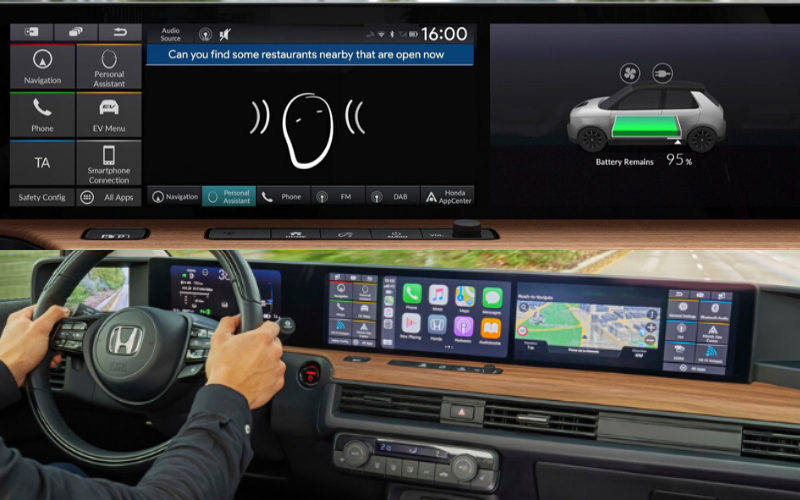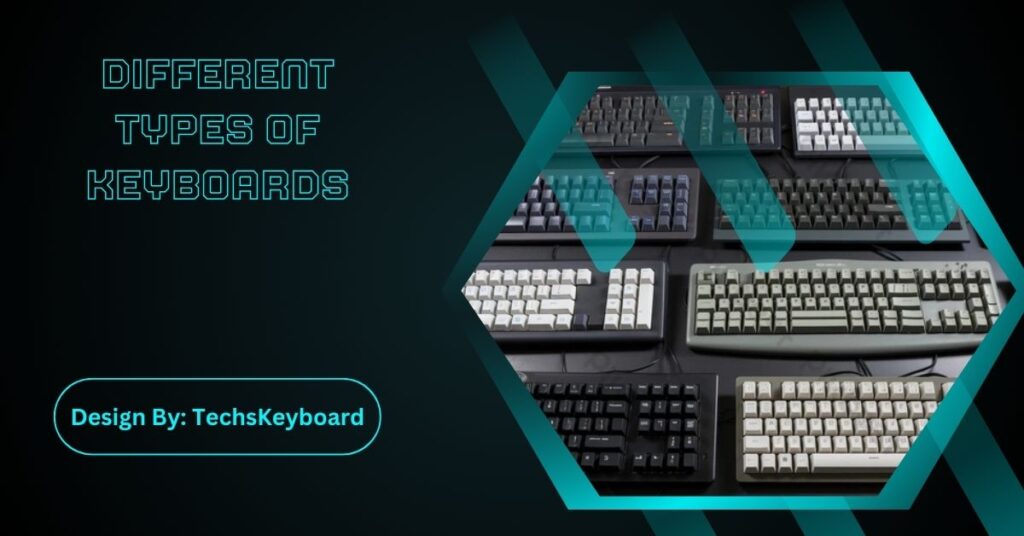Keyboards come in various types, including standard, mechanical, membrane, ergonomic, and gaming keyboards. Each offers unique features, catering to specific needs like comfort, gaming, affordability, or professional use.
Introduction:
Keyboards are an integral part of modern computing. Whether you’re typing up a report, coding, gaming, or simply chatting with friends, the right keyboard can make all the difference. With numerous options available on the market, understanding keyboard types and their unique features is essential in choosing the one that best suits your needs.
This blog will guide you through the different types of keyboards, their benefits, limitations, and how to pick the ideal one for your specific tasks.
Types of Keyboards:

1. Standard Keyboards
The most common type of keyboard, standard keyboards are typically bundled with most PCs and laptops.
Features:
- Often comes with 101-104 keys, including function keys, numeric pads, and a layout suited for general tasks.
- Lightweight and compact in design (especially in laptop versions).
Benefits:
- Affordable and widely available.
- Suitable for basic typing and everyday computer tasks.
Drawbacks:
- Lacks advanced features or ergonomics.
- May feel less comfortable for prolonged use.
Best For:
General users who need a simple, no-frills typing experience.
2. Mechanical Keyboards
Favored by typists, gamers, and tech enthusiasts, mechanical keyboards use individual mechanical switches for each key.
Features:
- Provides tactile feedback and audible clicks.
- Durable switches with customizable options (e.g., linear, tactile, or clicky switches).
Benefits:
- Exceptional typing feedback and accuracy.
- Long-lasting with high-quality build materials.
- Highly customizable for lighting (RGB), keycaps, and macros.
Drawbacks:
- Higher price point compared to standard and membrane options.
- Louder key presses (not ideal for quiet environments).
Best For:
Gamers, programmers, and professionals needing precision and customization.
3. Membrane Keyboards
Membrane keyboards are popular due to their low cost and slim design. These keyboards use a pressure-sensitive membrane rather than individual switches.
Features:
- Thinner and more compact design.
- Quiet keystrokes.
Benefits:
- Budget-friendly and lightweight.
- Suitable for casual typing or home use.
Drawbacks:
- Shorter lifespan compared to mechanical keyboards.
- Less tactile feedback and accuracy.
Best For:
Casual users, students, and those looking for a budget-friendly option.
4. Ergonomic Keyboards
Designed for maximum comfort, ergonomic keyboards help reduce strain on the wrists and hands. They often feature split key layouts, curved designs, or wrist supports.
Features:
- Split or angled key arrangement.
- Wrist support and special ergonomic design elements.
Benefits:
- Reduces the risk of repetitive strain injuries (RSIs).
- Promotes better posture while typing.
Drawbacks:
- May have a steeper learning curve for first-time users.
- Typically more expensive.
Best For:
Professionals who type for extended periods and those focusing on wrist health.
5. Gaming Keyboards
Tailored specifically for gaming enthusiasts, gaming keyboards offer features like programmable keys, RGB lighting, and anti-ghosting technology.
Features:
- High responsiveness and mechanical switches.
- RGB lighting and custom key mapping options.
- Additional game-centric features like N-key rollover and macros.
Benefits:
- Enhances gaming performance and aesthetics.
- Durable and designed for high-intensity use.
Drawbacks:
- Typically expensive.
- Unnecessary for non-gamers.
Best For:
Gaming enthusiasts and streamers who need precision and customization.
Also Read: Keyboard Numbers Not Working – Here’s How to Fix It!
How to Choose the Right Keyboard?
When picking a keyboard, keep in mind your priorities and use case. Here are a few factors to consider:
- Typing Comfort: If your day involves hours of typing, comfort should be a top priority. Look for ergonomic or mechanical keyboards for better tactile feedback and wrist support.
- Gaming Needs: If you’re a gamer, a keyboard with programmable keys, anti-ghosting, and RGB lighting can enhance your experience.
- Portability: If you need a keyboard you can carry easily, opt for lightweight membrane or compact mechanical models.
- Budget: Decide how much you’re willing to spend. Mechanical and gaming keyboards are great investments for avid users, whereas membrane keyboards cater to those on a budget.
- Design and Aesthetics: For a professional workspace, you might prefer sleek and quiet keyboards, while gamers might enjoy flashy RGB lighting features.
Types Of Keyboard:
Keyboards come in various types, each designed for specific needs. The most common are mechanical keyboards, known for their tactile switches, and membrane keyboards, which use pressure pads. Wireless keyboards connect via Bluetooth or RF, while ergonomic keyboards reduce strain.
Gaming keyboards feature RGB lighting and macro keys. Other types include virtual keyboards, projection keyboards, flexible keyboards, and chiclet keyboards, each offering unique functionality for different users.
Also Read: What Keyboard Does Faker Use – Complete Guide for 2025!
Future Trends in Keyboard Technology:
The world of keyboards continues to evolve, with exciting trends on the horizon.
- Wireless & Bluetooth Options: More keyboards are going wireless, offering added convenience and portability.
- Customizable Keyboards: The rise of hot-swappable mechanical keyboards allows users to change switches without soldering, personalizing their typing feel even further.
- Sustainability: Eco-friendly keyboards made with recyclable materials are gaining traction among environmentally conscious consumers.
- AI Integration: Keyboards with AI-powered predictive text and learning patterns might change the way we type in the near future.
Ergonomics and Comfortable Typing Experience:
An important aspect to consider when choosing a keyboard is ergonomics. Typing for prolonged periods can lead to discomfort and even potential health issues. With ergonomically designed keyboards, you can ensure a more comfortable typing experience by reducing strain on your wrists, arms, and fingers.
Look for keyboards with features like adjustable tilt, wrist rests, and split designs to support a more natural and relaxed hand position.
Advanced Connectivity Options:

In an increasingly connected world, keyboards with advanced connectivity options are gaining popularity. Look out for keyboards that offer not only wireless and Bluetooth connectivity but also seamless compatibility across multiple devices.
These versatile keyboards allow you to effortlessly switch between your computer, tablet, and smartphone, enhancing productivity and convenience.
Gaming-specific Features:
For gaming enthusiasts, keyboards with gaming-specific features can take your gaming experience to the next level. Look for keyboards with anti-ghosting and n-key rollover capabilities to ensure accurate and responsive keystrokes, particularly during intense gaming sessions.
Additionally, programmable macros and dedicated media controls can provide added customization and convenience for gamers.
Sustainability and Eco-friendly Options:
As environmental consciousness grows, so does the demand for sustainable and eco-friendly products, including keyboards. Consider opting for keyboards made from recyclable or biodegradable materials, reducing electronic waste and minimizing environmental impact.
Choosing keyboards from brands committed to sustainable practices can be a meaningful step towards a greener future.
The Importance of Keyboard Maintenance:
To prolong the lifespan of your keyboard and ensure optimal performance, proper maintenance is essential. Regularly cleaning your keyboard, avoiding spills, and using protective covers are simple yet effective ways to keep your keyboard in top condition. By practicing good keyboard maintenance, you can enhance its longevity and preserve its functionality for years to come.
Stay tuned for more exciting developments in keyboard technology and trends as the industry continues to innovate and cater to the evolving needs and preferences of users.
FAQs:
1. What is a standard keyboard best suited for?
Standard keyboards are ideal for basic tasks like typing, browsing, and general use. They are affordable and lightweight, making them a great option for casual users.
2. Why choose a mechanical keyboard?
Superior tactile feedback, robustness, and customisation are all provided by mechanical keyboards. Gamers, programmers, and professionals who value accuracy and comfortable typing will find them ideal.
3. What are the advantages of ergonomic keyboards?
Ergonomic keyboards help reduce wrist strain and improve posture. They’re designed for extended typing sessions, providing comfort and reducing the risk of repetitive strain injuries.
4. Are gaming keyboards necessary for gamers?
Gaming keyboards enhance performance with features like anti-ghosting, RGB lighting, and programmable keys. They’re ideal for gamers seeking precision, customization, and durability during gameplay.
5. How does a membrane keyboard differ from a mechanical one?
Membrane keyboards are quieter, more compact, and budget-friendly but lack the tactile feedback and longevity of mechanical keyboards, which are favored for precision and durability.
Conclusion:
Choosing the right keyboard depends on your needs, whether it’s gaming, typing comfort, or budget. Mechanical keyboards are durable and precise, ergonomic models prioritize comfort, while standard and membrane keyboards suit casual users. As technology advances, innovations like wireless options and eco-friendly designs enhance functionality and sustainability, ensuring keyboards meet evolving user preferences.


